

 Vol. 39 (Number 38) Year 2018. Page 4
Vol. 39 (Number 38) Year 2018. Page 4
Marina Georgievna SERGEEVA 1; Yanina Aleksandrovna CHIGHOVSKAYA-NAZAROVA 2; Svetlana Vladimirovna DMITRICHENKOVA 3; Svetlana Yuryevna PAPIROVSKAYA 4; Vera Arnoldovna CHAUZOVA 5; Irina Stanislavovna ANDRYUSHCHENKO 6
Received: 16/04/2018 • Approved: 03/06/2018
2. Methodology of the research
ABSTRACT: An educational institution should focus on a generalized model of a competitive specialist in order to meet the needs of a market economy in the provision of educational services. The technology of model development consists of the formation of the components of professional activity (the analysis of professional activity, the identification of basic labor functions and professional skills) and the training of a specialist (creating a set of tasks and tasks for mastering the necessary skills, introducing corrections into syllabus, improving the forms and methods of education, etc.). Results of the research. The theoretical professional training of students of two specialties was evaluated by testing their core competences using personal computer. As a basis in the assessment of the theoretical professional training of students was assumed the methodology proposed by A.A. Leonovich. According to the assessment of knowledge in five main academic disciplines, the generalized coefficient of theoretical professional training was calculated. The personal and business qualities necessary for a modern person in a market economy have been evaluated in a number of psychological tests. Discussion. During the process of the research, a number of indicators for assessing practical professional training was developed: the number of tasks performed for a certain time; the quality of the task; efficiency of the task. Conclusion. The data of the experimental part of the study confirmed the hypothesis, based on the assumption that the development and introduction of imitative teaching methods into the educational process of professional education institutions will facilitate the training of a highly qualified specialist. |
RESUMEN: Una institución educativa debe centrarse en un modelo generalizado de un especialista competitivo con el fin de satisfacer las necesidades de una economía de mercado en la provisión de servicios educativos. La tecnología del desarrollo del modelo consiste en la formación de los componentes de la actividad profesional (el análisis de la actividad profesional, la identificación de las funciones laborales básicas y las habilidades profesionales) y la formación de un especialista (creando un conjunto de tareas para dominar las habilidades, introduciendo correcciones en el plan de estudios, mejorando las formas y métodos de educación, etc.). Resultados de la investigación. La formación profesional teórica de los estudiantes de dos especialidades se evaluó mediante la prueba de sus competencias básicas utilizando la computadora personal. Como base en la evaluación de la formación profesional teórica de los estudiantes se asumió la metodología propuesta por A.A. Leonovich. De acuerdo con la evaluación del conocimiento en cinco disciplinas académicas principales, se calculó el coeficiente generalizado de formación profesional teórica. Las cualidades personales y comerciales necesarias para una persona moderna en una economía de mercado han sido evaluadas en una serie de pruebas psicológicas. Discusión. Durante el proceso de la investigación, se desarrolló una serie de indicadores para evaluar la formación profesional práctica: el número de tareas realizadas durante un tiempo determinado; la calidad de la tarea; eficiencia de la tarea. Conclusión. Los datos de la parte experimental del estudio confirmaron la hipótesis, basada en la suposición de que el desarrollo y la introducción de métodos de enseñanza imitativos en el proceso educativo de las instituciones de educación profesional facilitarán la capacitación de un especialista altamente calificado. |
Teaching methods as ways of interconnected activities of the teacher and students are aimed at mastering abilities and skills, as well as the upbringing and development of personality. It is necessary for a teacher of school of higher education to choose methods, which can provide training of qualified staff, competitive in the labor market.
This can be promoted by active teaching methods [Lomakina and Sergeeva, 2008; Mukhin, et al., 2017a], which, depending on the orientation towards the formation of a knowledge system or the mastery of abilities and skills, are divided into non-imitative (problem lecture, heuristic conversation, training discussion, exploratory laboratory work, etc.) and imitative - non-gaming (analysis of specific situations, solution of situational problems, exercises, following the instructions, etc.) and gaming (imitation of activities with the simulator, role-playing, business game, moderation, etc.).
An educational institution should focus on a generalized model of a competitive specialist in order to meet the needs of a market economy in the provision of educational services.This model takes into account the external (the level of the country's competitiveness, the level of competitiveness of the industry, the level of competitiveness of the region, etc.) and internal factors (the rationality of the organizational and managerial structures of training schools and colleges, the proficiency of the pedagogical staff, the available material and technical facilities, etc.) and contains the following skills: technical (specialty and specialization), economic (costs of training a specialist), socio-organizational (social structure of consumers), personal (psychological, cognitive, behavioral), informative (knowledge, skills and specialties formed in three directions: socialization, adaptive properties in labor market conditions and professionally important qualities).The technology of model development [Sirotyuk and Sergeeva, 2011; Mikheeva, 2016] consists of the formation of the components of professional activity (the analysis of professional activity, the identification of basic labor functions and professional skills) and training of specialists (creating a set of tasks and tasks for mastering the necessary skills, introducing corrections into syllabus, improving the forms and methods of education, etc.).
A scientific laboratory of innovative technologies in education was established in Tver College named after A. N. Konyaev. The aim of the laboratory is to introduce into the educational process imitation training methods for the preparation of a competitive college graduate who can: flexibly adapt for changing life situations, independently acquire necessary knowledge and skillfully put them in practice; think independently and critically, be able to see the difficulties that arise in the real world and seek ways to rationally overcome them, using modern technologies; clearly understand where and how the knowledge, acquired by them, can be applied in the surrounding reality; be able to generate new ideas, think creatively, work with information competently; be sociable, contact in various social groups, be able to work together in different areas, preventing conflict situations or skillfully withdraw them; work on the development of their own morality, intellect, cultural level independently.
Thus, the authors are trying to find new approaches to the professional education and training of specialists, who can be competitive in the labor market, involving administrative, managerial, teaching staff, in the social and educational cooperation within the educational institution.
The process of forming a competitive specialist and its practical implementation were tested during the pilot training of students at Tver College named after A.N. Konyaev.
Several tasks were under the study during the experiment:
1) to identify the content of education (a description of the final knowledge and skills of students, a thematic plan, didactic units).
2) to make a choice of imitation methods of teaching and pedagogical conditions of their application in the process of preparing of a mid-level specialist.
3) to evaluate the formation indicators of a competitive mid-level specialist.
During two years, the college students were involved in the experiment - 12 groups (343 people), studying in the specialties "Economics and accounting (in different areas)" and "Tourism". Of these, the experiment involved:
In total – 179 students.
The number of students taken part in the experiment:
In total – 165 students.
The experiment was conducted in several stages: ascertaining, forming, control.
The theoretical professional training of students in profiling academic disciplines and the personal qualities of students was assessed, using psychological tests during the experiment.
Theoretical professional training of students by testing them using PC on majors in two specialties was evaluated. To achieve this purpose a computer test, which includes 400 questions on the major, was developed [Micheeva, et al., 2017].
For course 080114 "Economics and accounting (in different areas)" questions on the following subjects were included in the test: accounting, analysis of financial and economic activities of the enterprise (AFEA), management, audit, taxes and taxation.
For course 100401 "Tourism" psychology of business communication, management of the functional unit, marketing technologies in tourism, technology and organization of tour operator activity, organization of tourists leisure [Mukhin, et al., 2017b] were tested.
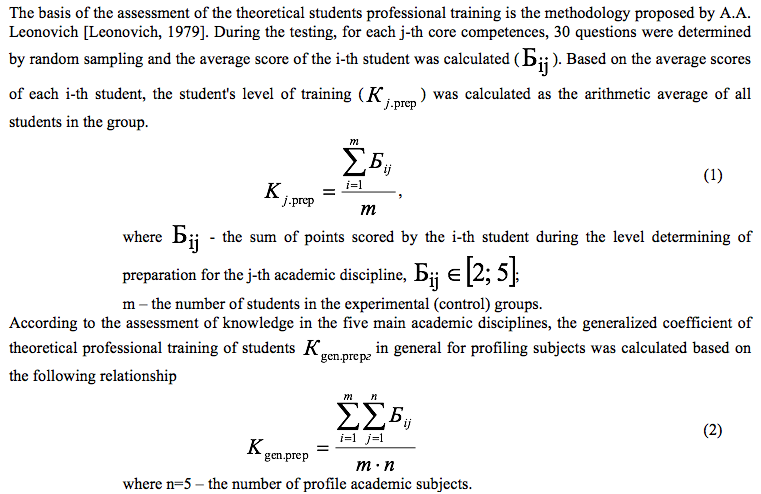
The results of the professional training of the ascertaining stage are presented in Table 1, where one can see that the professional training of students in the control and experimental groups is practically the same, the generalized coefficient of theoretical professional training in the experimental groups is 4.0, and in the control groups - 3.99, so one can state that conditions in which students entered the experiment were equal.
The personal and business qualities necessary for a modern person in a market economy were evaluated by a number of psychological tests suggested by A. Prutchenkov [Prutchenkov, et al., 1994, pp.26-29]:
The test "The self- control skill" allowed the evaluation of the following personal qualities of students: empathy, authenticity, stress-resistance. With the help of the tests "Specific features of behavior in a conflict situation" and "Communicative and organizational abilities", such personal qualities as interpersonal skills, responsibility, ability to lead and obey, ability to take risks were evaluated [Sergeeva & Nikitina, 2016].
A new imitation method of training was introduced in the form of the "Training Firm" case-study during the formative stage in the experimental groups. The tasks of the formative stage were the choice of imitation methods of teaching and the pedagogical conditions for their application in the process of preparing a mid-level specialist. We also defined the content and technology of using the new method "Training Firm" [Lomakina and Sergeeva, 2011; Sergeeva, Sokolova, et al., 2018].
Table 1
Professional training of students during the ascertaining stage
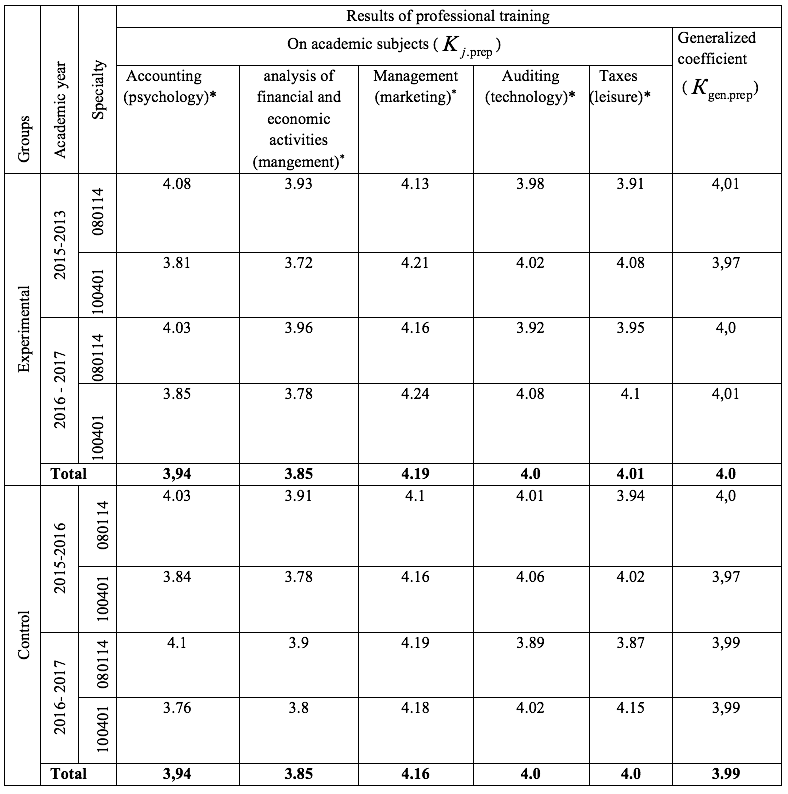
Comments: parentheses (..) * indicates profiling academic disciplines for specialty 100401
In the control groups classes were held according to the usual calendar-thematic plans during the formative stage.
The aims of the control stage were:
1. Testing the hypothesis.
2. Preparation assessment of the college graduate, competitive in the labor market and ready for professional growth.
Initially, during the control phase, theoretical professional knowledge was evaluated according to formulas 1 and 2. The results of the professional knowledge testing during the control phase are presented in Table 2.
Table 2
Professional training of students during the control stage
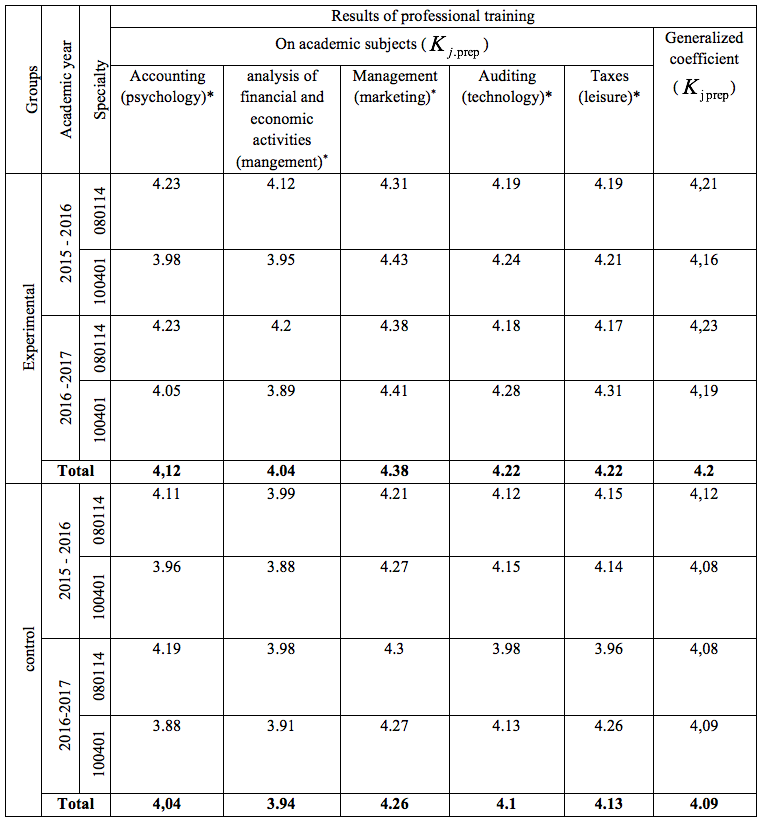
Comparing the results of tables 1 and 2 one can conclude, that the level of knowledge in both control and experimental groups slightly increased. In the control groups, the generalized coefficient of theoretical professional training increased by 2.5% and amounted to 4.09 points, while in the experimental groups it increased by 5.0% and amounted to 4.2.
Taking into account that the assessment of professional knowledge does not provide a definite answer for a question “how to train a mid-level specialist competitive in the labor market”, it is necessary to go beyond the limits of traditional methods, for example, an indicator of achievement, when assessing the effectiveness of imitative teaching methods. The existing methods of monitoring are aimed at determining exclusively individual progress [Sergeeva, et al., 2017].
That’s why, along with the verification of theoretical professional knowledge, the same as during the ascertaining stage, a number of indicators for assessing practical training were developed during the research [Sergeyeva, 2007]:

These types of indicators, except the second, cannot be evaluated during the test, oral answer or written work. Therefore, we suggested to check the effectiveness of the use of imitation methods of teaching during the experiment (business game), both in the experimental and control groups. At the same time, the topic of the business game for students of a particular specialization was chosen according to one of the profiling academic disciplines. For students enrolled in the specialty 080114 "Economics and accounting (in different areas)")", a business game was proposed on the topic "Inventory of goods and materials". For students studying in the specialty 100401 "Tourism", a business game on the topic "Recruitment" was offered [Neverkovich, et al., 2018].
During the business game, the time and quality of the tasks solution, the students' ability to apply theoretical knowledge in solving practical problems were recorded. The indicators were evaluated on a five-point scale, in addition to the indicator "the number of completed tasks" (Table 3).
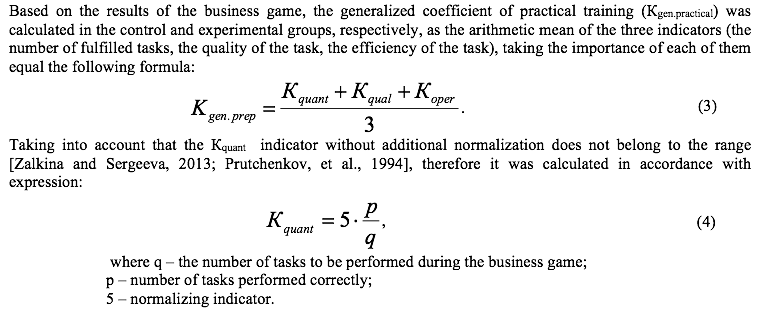
Table 3
Indicators of practical training
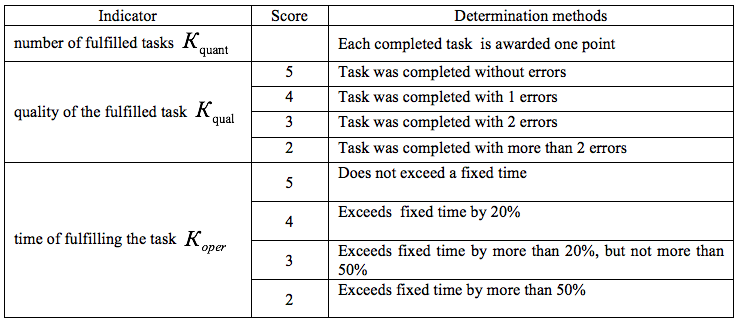
The results of the case study are summarized in Table 4. The analysis of the results of the case study (Figure 1) shows that with practically the same theoretical training of students in the control and experimental groups (the difference in the average score is about 0.1), the quality assessment indicators training of mid-level professionals in the process of professional action in the experimental groups is much higher. Thus, the indicator of the number of completed assignments for Кquant by the students of the experimental groups is more by 7.6%, the quality indicator for the tasks Кqual - by 14.5%, the Кoper operational efficiency indicator - by 7.7%, and the generalized coefficient of practical training К gen.prep - by 9.7%.
Table 4
The results of the case study
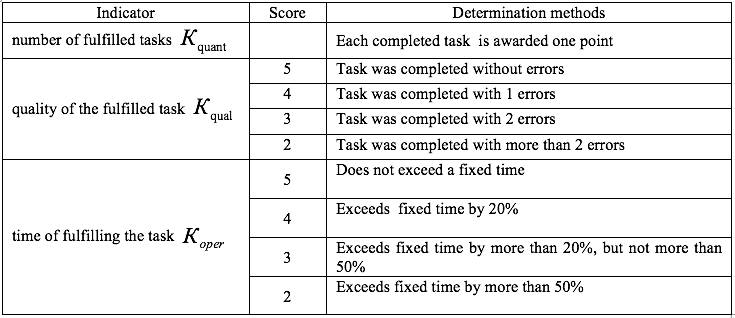
------
Figure 1
The results of the case study
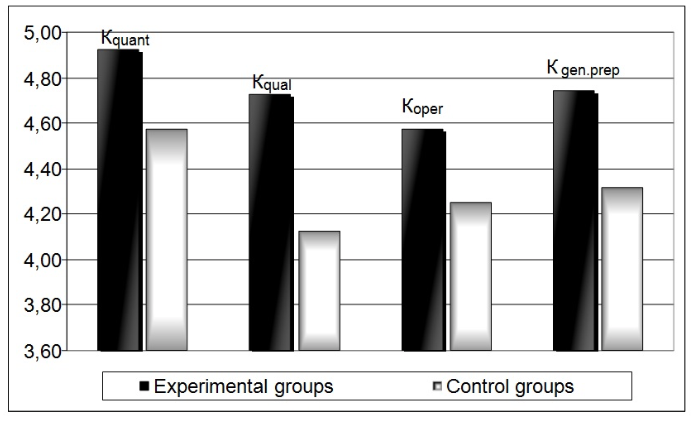
The increase in the number of completed tasks and the quality of performance of tasks in the experimental groups shows that the active use of imitative teaching methods contributes to the better formation of professional theoretical knowledge and the development of personal qualities. The increase in the measure of efficiency proves the formation of such personal characteristics as the speed of reaction, the quality of knowledge and their efficiency.

The results of calculations of the quality indicators for the training of mid-level specialists are summarized in Table 5, from which it can be seen that the generalized indicator of the quality of the training of specialists during the control phase in the experimental groups is 0.26 points higher (by 6.2%).
Table 5
Quality indicators of training of middle level specialists

This suggests that, despite the slight increase in theoretical knowledge, the students of the experimental groups learned to apply the acquired knowledge better solving practical problems, and the ability to work in a team was formed. In addition, during the control phase, all students were re-evaluated personal qualities according to the tests given above. The results of psychological testing show that students of experimental groups during the training using imitation methods of education have learned to control themselves better, are able to apply different styles of behavior and choose more optimal tactics of behavior [Sergeeva, Komarovskaya, et al., 2018].
The data of the experimental part of the study confirmed the hypothesis of the study, which consists in the assumption that the development and introduction of educational methods in the academic course of educational institutions will facilitate the training of highly qualified specialists, competitive in the labor market and ready for professional growth, if [Sergeeva, Bedenko, et al., 2018]:
Zalkina, N.P. and Sergeeva, M.G. (2013). Building a professional career in the context of a competence approach: Monography. Kursk: Regional Financial and Economic Institute, 246 p.
Leonovich, I.I. (1979). Quality criteria of the educational process. Minsk: Vyshjejshaja shkola, 148 p.
Lomakina T.Yu., Sergeeva M.G. (2011). Innovative activity in professional education: Monography. Kursk: National Center for UNEVOC, 280 p.
Lomakina, T.Y. and Sergeeva, M.G. (2008). Pedagogical technologies in professional educational institutions. Moscow: Academia, 288 p.
Prutchenkov, A.S., Raizberg, B.A. and Shemyakin, B.P. (1994). Market? The market ... Hooray! The market !: Collection of games, test and contest assignments, tasks, crossword puzzles. Moscow: New School, 64 p.
Sergeeva, M.G. (2007). Imitational methods of professional training: Monograph. Moscow: ITIP RAO, 188 p.
Sirotyuk, A.L. and Sergeeva, M.G. (2011). Innovative approach at teaching in the professional school: Monograph. Kursk: Publishing House of RFEI, 226 p.
Micheeva, N.F., Popova, E.A. & Ignashina, Z.N. (6th-8th March 2017). Teaching Latin-American Spanish in Russia: communication difficulties approach (pp. 3526-3534). 11th International Technology, Education and Development Conference. Valencia, Spain, INTED Proceedings.
Mikheeva, N.F. (2016). II Firsova’s readings: On the international conference “Contemporary Philology and Methodology of Foreign Language Teaching: Basic Tendencies and Development Prospects”. Moscow, April 26–27, 2016. Vestnik rossiiskogo universiteta druzhby narodov seriya Lingvistika – Russian Journal of Linguistics [Proceedings of Peoples’ Friendship University of Russia, Section “Linguistics” – Russian Journal of Linguistics], 20(2), 149-151.
Mukhin, M.I., Mishatkina, M.V., Samokhin, I.S. & Sokolova, N.L. (2017a). Health-sustaining environment of an educational institution (pp. 448-456). International conference “Education Environment for the Information Age” (EEIA 2017). European Proceedings of Social and Behavioural Sciences, 28. Retrieved from http://dx.doi.org/10.15405/epsbs.2017.08.53.
Mukhin, M.I., Mishatkina, M.V. & Sokolova, N.L. (2017b). On the issue of institutional and methodological foundations of teacher’s training (pp. 457-465). International conference “Education environment for the Information Age (EEIA 2017). European Proceedings of Social and Behavioural Sciences, 28. Retrieved from http://dx.doi.org/10.15405/epsbs.2017.08.54.
Neverkovich, S.D., Bubnova, I.S., Kosarenko, N.N., Sakhieva, R.G., Sizova, Zh.M., Zakharova, V.L. & Sergeyeva, M.G. (2018). Students’ Internet Addiction: Study and Prevention. Eurasia Journal of Mathematics, Science and Technology Education, 14(4), 1483-1495.
Sergeeva, M.G. & Nikitina, E.E. (3 August, 2016). Criteria indicators of formation of economic competence of system of the general education. International Conference “Education Environment for the Information Age” (EEIA-2016), Moscow, Russia, Retrieved from http://dx.doi.org/10.1051/shsconf/20162901064.
Sergeeva, M.G., Flyagina, V.Yu., Taranenko, I.V., Krasnova, E.V. & Vilkova, A.V. (2017). The interaction of labor market and educational services market considering social partnership mechanism and specificity of the regional educational policy. Ponte, 73(12), 2.
Sergeeva, M.G., Sokolova, N.L., Ippolitova, N.V., Tabueva, E.V., Ilyinskaya, I.P. & Bakhtigulova, L.B. (2018). Psychological and pedagogical support for the social worker’s professional development. Espacios, 39(2), 26.
Sergeeva, M.G., Komarovskaya, E.P., Bakhtigulova, L.B., Tabuyeva, E.V., Kalashnikov, P.F. & Galyuk, A.D. (2018). "Educational company": Peculiarities of the technology’s implementation at different educational levels when forming the economic competencies of future specialists. Espacios, 39(2), 25.
Sergeeva, M.G., Bedenko, N.N., Karavanova, L.Zh., Tsibizova, T.Yu., Samokhin, I.S. & Anwar, M.S.M. (2018). "Educational company" (Technology): Peculiarities of its implementation in the system of professional education. Espacios, 39(2), 24.
1. Bauman Moscow State Technical University (National Research University), 105005, Russia, 2nd Baumanskaya Street, 7. E-mail: sergeeva198262@mail.ru
2. Glazow State Padagogical Institute named after V.G. Korolenko, 427621, Russia, Udmurt Republic, Glazow, Pervomajskaja, 25. E-mail: yaninaggpi@yandex.ru
3. Academy of Engineering, Peoples’ Friendship University of Russia (RUDN University), 117198, Russia, Moscow, Miklukho-Maklay Street, 6. E-mail: Dmitrichenkova_sv@rudn.university
4. Shadrinsky State Pedagogical University, 641870, Russia, Shadrinsk, Kurgan oblast, Karl Libknekht Street, 3. E-mail: dekan-at.fdp@mail.ru
5. Academy of Engineering, Peoples’ Friendship University of Russia (RUDN University), 117198, Russia, Moscow, Miklukho-Maklay Street, 6. E-mail: chauzova_va@rudn.university.ru
6. Academy of Engineering, Peoples’ Friendship University of Russia (RUDN University), 117198, Russia, Moscow, Miklukho-Maklay Street, 6. E-mail: andryushchenko_is@rudn.university